to of和for的区别
关于of和for的用法

关于of和for的用法一、of和for的基本区别英语中,介词“of”和“for”是非常常用且易于混淆的介词,它们在不同的情况下有着不同的用法和含义。
正确掌握其用法对于提高写作和口语表达的准确性至关重要。
本文将详细讨论“of”和“for”的用法,并给出实际例子加以说明。
二、描述所属关系及材料来源:使用“of”1. 描述所属或归类关系当我们想要表示一个事物属于另一个事物或被包含在其中时,通常使用介词"of"来表示这种关系。
例:- The tail of the dog was wagging happily.(狗的尾巴正在快乐地摇摆。
)- The paintings of Monet are world-famous.(莫奈的画作举世闻名。
)2. 描述材料的来源我们经常使用"of"来表示某物是由另一种物质制成或组成。
例:- This desk is made of wood.(这张桌子是由木头做成的。
)- The bookshelf is filled with books of various genres.(书架上堆满了各种类型的书籍。
)三、表示目标、目的和适用范围:使用“for”1. 表示目标和目的当我们想要表达某种行为或事物是为了达到特定目标或目的时,我们通常使用介词"for"。
例:- I bought a new laptop for work.(我买了一台新笔记本电脑用于工作。
)- This medicine is for curing headaches.(这种药是治头痛用的。
)2. 描述适用范围或对象"for" 还可以用来表示某个行动、评论或建议适用于特定对象。
例:- This book is for children aged 8-12.(这本书适合8至12岁的儿童。
)- Please write a report for the meeting tomorrow.(请写一份明天会议需要的报告。
fortooffrom的区别
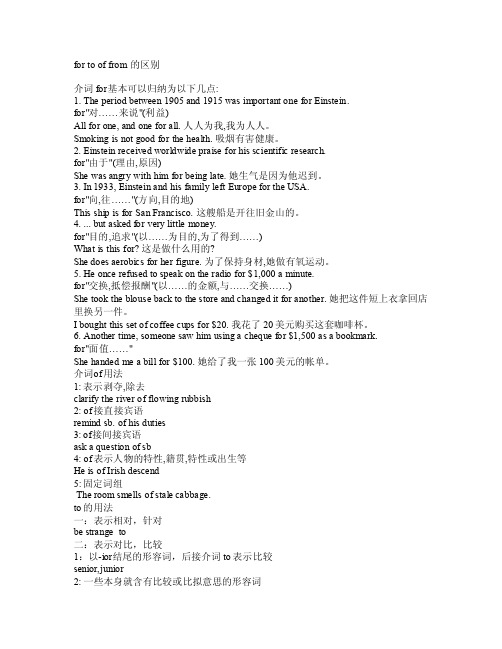
for to of f rom 的区别介词for基本可以归纳为以下几点:1. Theperio d bet ween1905and 1915 w as im porta nt on e for Eins tein.for"对……来说"(利益)Al l for one, andone f or al l. 人人为我,我为人人。
Smoki ng is notgoodfor t he he alth.吸烟有害健康。
2. Ei nstei n rec eived worl dwide prai se fo r his scie ntifi c res earch.fo r"由于"(理由,原因)S he wa s ang ry wi th hi m for bein g lat e. 她生气是因为他迟到。
3. In 1933, Ein stein andhis f amily left Euro pe fo r the USA.for"向,往……"(方向,目的地)Thi s shi p isfor S an Fr ancis co. 这艘船是开往旧金山的。
4.... b ut as ked f or ve ry li ttlemoney.fo r"目的,追求"(以……为目的,为了得到……) Whatis th is fo r? 这是做什么用的?Sh e doe s aer obics forher f igure. 为了保持身材,她做有氧运动。
5. He o nce r efuse d tospeak on t he ra dio f or $1,000a min ute.for"交换,抵偿报酬"(以……的金额,与……交换……)Shetookthe b louse back to t he st ore a nd ch anged it f or an other. 她把这件短上衣拿回店里换另一件。
to for of有什么区别
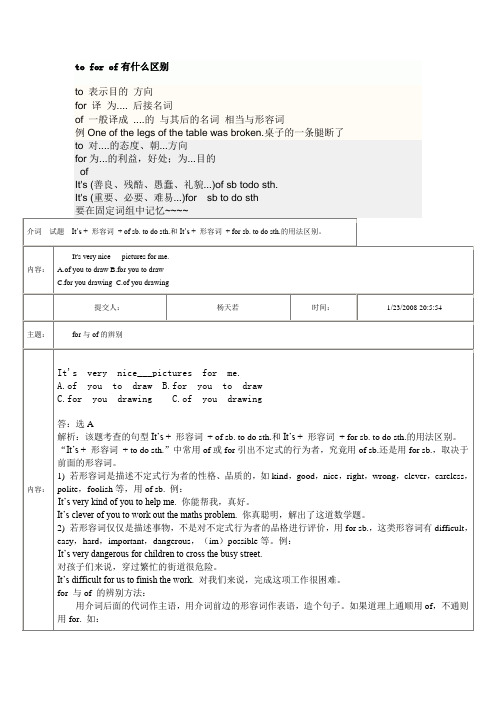
of: 1.表示剥夺,除去2.of接直接宾语3.of接间接宾语4.of表示人物的特性,籍贯,特性或出生等with: 1.基本的意思是"用"2.with+宾语+现在分词或短语3.with+宾语+形容词或短语4.with+宾语+介词短语5.with+宾语+副词虚词to: 一般用在固...各类介词:in ,of, on ,to,with ,of,at的用法- \r\n介词在英语用词里也属于难缠的一个项目。
因为它涉及方面很广,而且变化多端,往往令人捉摸不定,记起来很麻烦。
因此就有有心人弄了一个《介词口诀》来帮助学习者;也有人写了令学习者一面唱歌一面轻松地记忆介词的用法。
介词英文叫作Preposition (简称prep),它由pre和position组成,pre是前面的意思,而position是位置的意思。
因此以前中文译作“前置词”,就是一种放在名词(或相当于名词的词语)前面的虚词。
一、常用的介词about,above,across,after,against,around,at,before,behind,below,beneath,beside,besides,between,beyond,by, down,during, except, for,from, in,inside,into, like, near, of,off,on,out,outside,over, since,through,throughout,till,to,toward, under,until,up,upon, with,without, according to, because of, by way of,in addition to, in front of, in place of, in regard to, in spite of, instead of, on account of, out of.哇,这么一大堆!别怕别怕,大部份的介词都不难理解,比较令人头痛的只是下列几个at, by, to, in, for, of, on, from, with其中又以 at, by, in, on 为四大“要犯"!学习介词就是要抓住这几"要犯",看招吧,嘿嘿!!1. In the summer at the seaside (季节用in, 在海边用at)On the coast we like it fine (在海岸用on)but in winter ,yes ,at Christmas (在圣诞用at)By the fireside we recline (放置) (在炉边用by)2. In July we went to Kenya (月份用in)Stayed in Lamu by the sea, (住在Lamu用in)We came back to TanzaniaThen across Victoria sea3. Did you come here in a taxi? (乘出租汽车用in)Or by bus, or on the train? (乘公共汽车用by, 乘火车用on) Did you come on foot this evening (步行用on)Or perhaps by aeroplane? (乘飞机用by)4. Will you come to tea on Monday? (在星期一用on)I′ll be home at half past three (时间三点半用at)Yes, I′ll stay for half an hour (长达半小时用for)if you buy some beer for me (给我for me)5. In the morning I drink coffee (早晨用in the morning)In the afternoon there′s tea (下午用in the afternoon) In the evening I have cocoa (傍晚用in the evening)Yes, at night ,it′s good for me. (晚上用at night)6. Where′s my pencil?In the kitchen (厨房里in the kitchen) On the table near the chair (在桌上on the table, 在椅边near the chair)Underneath the cup and saucer (在杯和碟的下面underneath...)Just behind the teapot there (在茶壶后边behind...)7. Can you tell me how to get toMr. Johnson′s coffee-bar?Down the street and round the corner (down the street 沿着街道,round...绕过)Past the church and there you are8. Where′s the bookshop? Over there,dear (over there 那里)First turn left,then go straight on,Along the road,across the market (沿着路along the road, 穿过市场 across...)It′s in front of you, dear John (在你前面in front of you) 9. There is nothing on the radio (广播on the radio) "Songs with orchestra" they said. (with后orchestra为有形物,无形物则用by)I′m not interested in music (interested in 兴趣于)so I think I′ll go to bed10. In a moment I′ll be finished (in a moment 片刻里) With these prepositions-soI will say to you in Englishtill the next time, cheerio (加油呀) (till... 直到)怎样?你就学到许多介词用法喽。
for,of和to的用法区别

for,of和to的用法区别一、for, of和to的用法区别在学习英语时,我们常常会遇到一些常见的词汇或者短语,其中包括了一些介词的使用。
本文将详细讨论三个常用介词:“for”,“of”和“to”的用法,并解释它们之间的区别。
A. "For"的用法介词“for”有多种用法,下面我们将分开进行讨论:1. 表示目的或原因:例如,“I am studying English for better job prospects.” (我学习英语是为了有更好的职业前途。
)这里,“for”表示了学习英语的目的。
2. 表示付出报酬或交换:例如,“She gave me money for the book.”(她给了我钱购买这本书。
)这里,“for”表示交换行为中对方所支付的报酬。
3. 表示时间期限:例如,“They lived abroad for five years.”(他们在国外生活了五年。
)这里,“for”表示持续时间。
4. 表示接受某事物:例如,“I will exchange my old phone for a new one.”(我会把旧手机换成新手机。
)这里,“for”表示交换行为中得到的事物。
B. "Of" 的用法与“for”的多种用法相比, 介词“of”的作用范围更为广泛。
下面我们来看几个常见的用法:1. 表示所属关系:例如,“The cover of the book is red.” (书的封面是红色的。
)这里,“of”表示物体与它所属的对象之间的关系。
2. 表示来源或原因:例如,“I am tired of studying all day.”(整天学习让我感到疲倦。
)这里,“of”表示造成疲倦状态的原因。
3. 表示一种性质或特征:例如,“A cup of tea”(一杯茶)这里,“of”表示一个容器中装有某种液体。
4. 表示一部分组成整体:例如,“A piece of cake”(一块蛋糕)这里,“of”表示蛋糕中的一部分。
for和to,of的用法区别
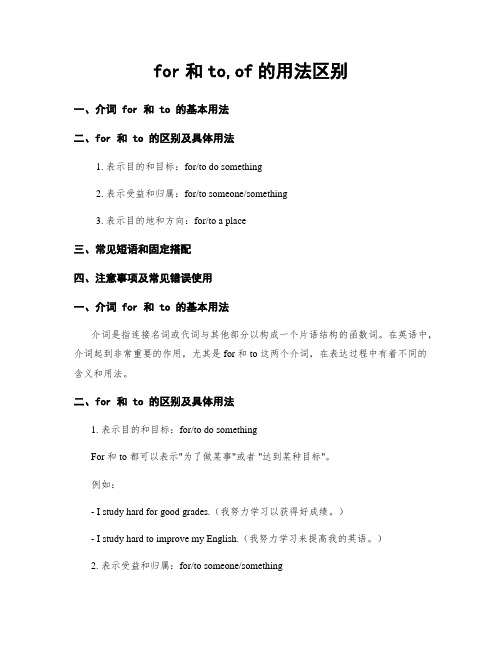
for和to,of的用法区别一、介词 for 和 to 的基本用法二、for 和 to 的区别及具体用法1. 表示目的和目标:for/to do something2. 表示受益和归属:for/to someone/something3. 表示目的地和方向:for/to a place三、常见短语和固定搭配四、注意事项及常见错误使用一、介词 for 和 to 的基本用法介词是指连接名词或代词与其他部分以构成一个片语结构的函数词。
在英语中,介词起到非常重要的作用,尤其是 for 和 to 这两个介词,在表达过程中有着不同的含义和用法。
二、for 和 to 的区别及具体用法1. 表示目的和目标:for/to do somethingFor 和 to 都可以表示"为了做某事"或者 "达到某种目标"。
例如:- I study hard for good grades.(我努力学习以获得好成绩。
)- I study hard to improve my English.(我努力学习来提高我的英语。
)2. 表示受益和归属:for/to someone/somethingFor 强调给予,表示某人或某物是行动的受益者或拥有者;而 to 强调移交或传递,表示某人或某物是行动的对象。
例如:- I bought a gift for my mom.(我为我妈妈买了一份礼物。
)- I gave the gift to my mom.(我把礼物送给了我妈妈。
)3. 表示目的地和方向:for/to a placeFor 和 to 都可以表示"到达某个地方",但其语义略有不同,for 更强调旅行或移动过程,to 强调到达具体目的地。
例如:- We are going for a hike in the mountains.(我们要去山里徒步。
)- We are heading to the beach.(我们要去海滩。
to,of和for的区别
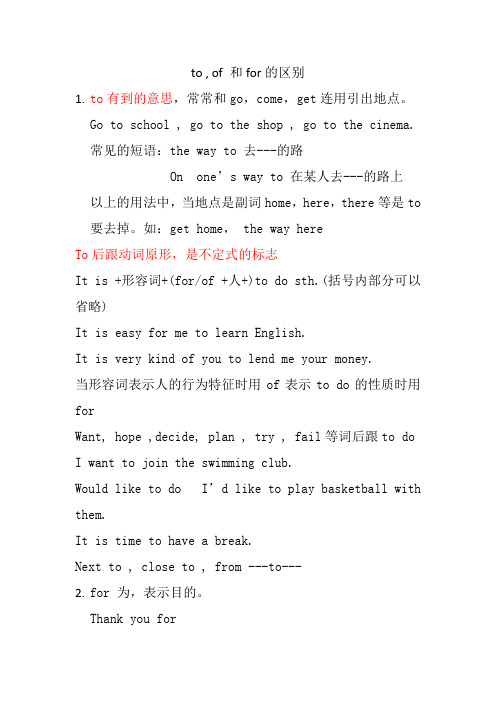
to , of 和for的区别1.to有到的意思,常常和go,come,get连用引出地点。
Go to school , go to the shop , go to the cinema.常见的短语:the way to 去---的路On one’s way to 在某人去---的路上以上的用法中,当地点是副词home,here,there等是to 要去掉。
如:get home, the way hereTo后跟动词原形,是不定式的标志It is +形容词+(for/of +人+)to do sth.(括号内部分可以省略)It is easy for me to learn English.It is very kind of you to lend me your money.当形容词表示人的行为特征时用of表示to do的性质时用forWant, hope ,decide, plan , try , fail等词后跟to do I want to join the swimming club.Would like to do I’d like to play basketball with them.It is time to have a break.Next to , close to , from ---to---2.for 为,表示目的。
Thank you forBuy sth for sb =buy sb sthIt is time for bed.Here is a letter for you.I will study for our country.3.of表示所属关系意思是:---的a map of the worlda friend of mine(注:专业文档是经验性极强的领域,无法思考和涵盖全面,素材和资料部分来自网络,供参考。
可复制、编制,期待你的好评与关注)。
to与for的用法和区别

t o与f o r的用法和区别Document number:NOCG-YUNOO-BUYTT-UU986-1986UTto与for的用法和区别一般情况下, to后面常接对象; for后面表示原因与目的为多。
Thank you for helping me.Thanks to all of you.to sb.表示对某人有直接影响比如,食物对某人好或者不好就用to;for表示从意义、价值等间接角度来说,例如对某人而言是重要的,就用for.for和to这两个介词,意义丰富,用法复杂。
这里仅就它们主要用法进行比较。
1. 表示各种“目的”1. What do you study English for 你为什么要学英语?2. She went to france for holiday. 她到法国度假去了。
3. These books are written for pupils. 这些书是为学生些的。
4. hope for the best, prepare for the worst. 作最好的打算,作最坏的准备。
2.对于1.She has a liking for painting. 她爱好绘画。
2.She had a natural gift for teaching. 她对教学有天赋/3.表示赞成同情,用for不用to.1. Are you for the idea or against it 你是支持还是反对这个想法?2. He expresses sympathy for the common people.. 他表现了对普通老百姓的同情。
3. I felt deeply sorry for my friend who was very ill.4 for表示因为,由于(常有较活译法)1 Thank you for coming. 谢谢你来。
2. France is famous for its wines. 法国因酒而出名。
for和to和of的用法区别
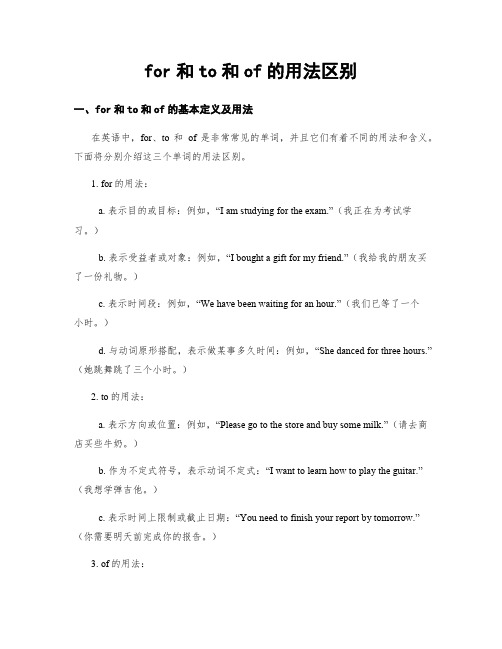
for和to和of的用法区别一、for和to和of的基本定义及用法在英语中,for、to和of是非常常见的单词,并且它们有着不同的用法和含义。
下面将分别介绍这三个单词的用法区别。
1. for的用法:a. 表示目的或目标:例如,“I am studying for the exam.”(我正在为考试学习。
)b. 表示受益者或对象:例如,“I bought a gift for my friend.”(我给我的朋友买了一份礼物。
)c. 表示时间段:例如,“We have been waiting for an hour.”(我们已等了一个小时。
)d. 与动词原形搭配,表示做某事多久时间:例如,“She danced for three hours.”(她跳舞跳了三个小时。
)2. to的用法:a. 表示方向或位置:例如,“Please go to the store and buy some milk.”(请去商店买些牛奶。
)b. 作为不定式符号,表示动词不定式:“I want to learn how to play the guitar.”(我想学弹吉他。
)c. 表示时间上限制或截止日期:“You need to finish your report by tomorrow.”(你需要明天前完成你的报告。
)3. of的用法:a. 表示身份归属关系:“The book on the table is mine.”(桌子上的那本书是我的。
)b. 描述属性或特征:“She has a pair of blue eyes.”(她有一双蓝眼睛。
)c. 表示出处或来源:“This is a picture of my family.”(这是我家人的照片。
)二、for和to和of的用法例句解析1. for的用法举例:a. I work hard for success.我为了成功而努力工作。
b. They bought a new car for their son's birthday.他们为了儿子的生日买了一辆新车。
- 1、下载文档前请自行甄别文档内容的完整性,平台不提供额外的编辑、内容补充、找答案等附加服务。
- 2、"仅部分预览"的文档,不可在线预览部分如存在完整性等问题,可反馈申请退款(可完整预览的文档不适用该条件!)。
- 3、如文档侵犯您的权益,请联系客服反馈,我们会尽快为您处理(人工客服工作时间:9:00-18:30)。
to , of 和for的区别
1.to有到的意思,常常和go,come,get连用引出地点。
Go to school , go to the shop , go to the cinema.
常见的短语:the way to 去---的路
On one’s way to 在某人去---的路上
以上的用法中,当地点是副词home,here,there等是to 要去掉。
如:get home,the way here
To后跟动词原形,是不定式的标志
It is +形容词+(for/of +人+)to do sth.(括号内部分可以省略) It is easy for me to learn English.
It is very kind of you to lend me your money.
当形容词表示人的行为特征时用of表示to do的性质时用for Want, hope ,decide, plan , try , fail等词后跟to do
I want to join the swimming club.
Would like to do I’d like to play basketball with them.
It is time to have a break.
Next to , close to , from ---to---
2.for 为,表示目的。
Thank you for
Buy sth for sb =buy sb sth
It is time for bed.
Here is a letter for you.
I will study for our country.
3.of表示所属关系意思是:---的
a map of the world
a friend of mine。
